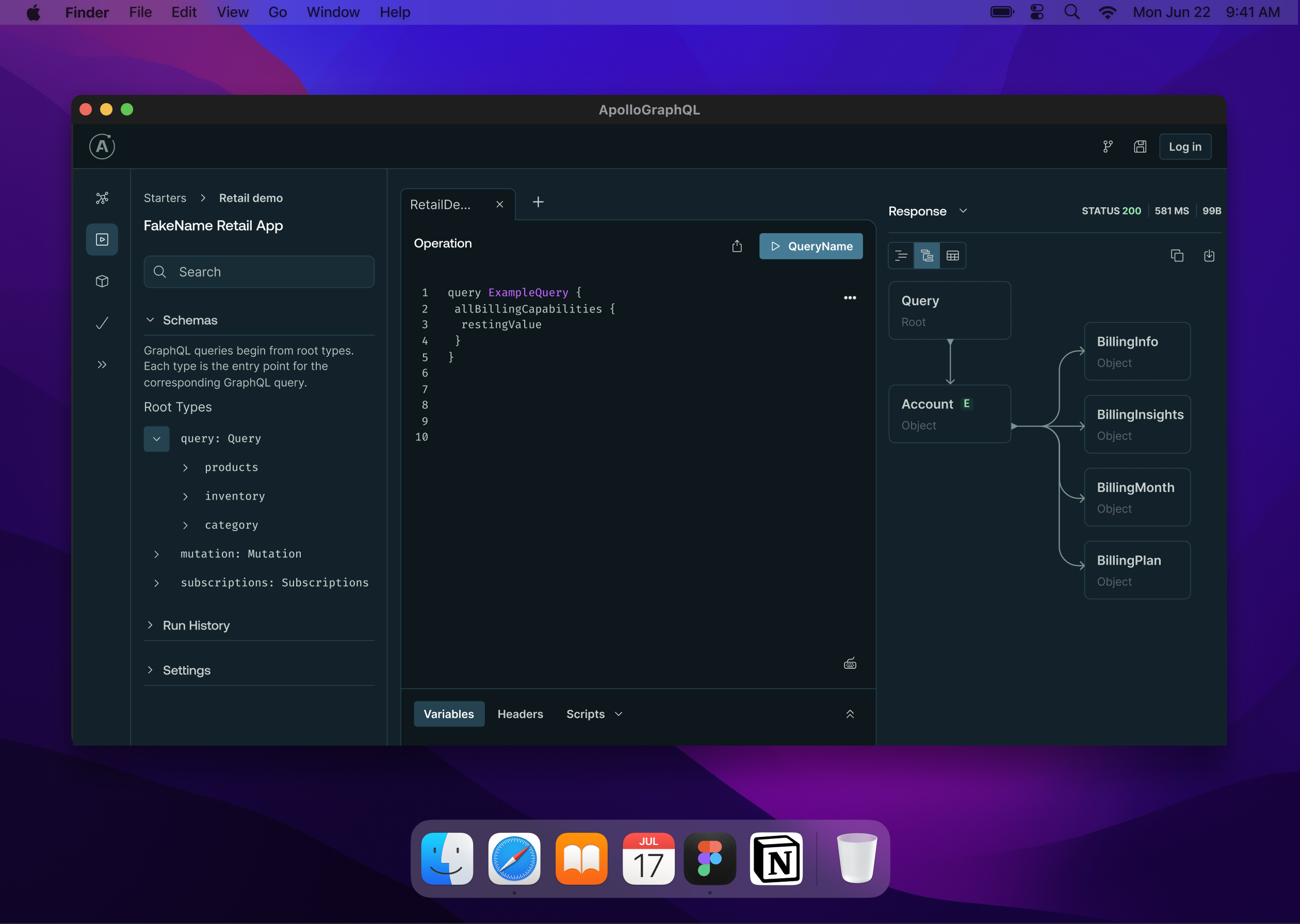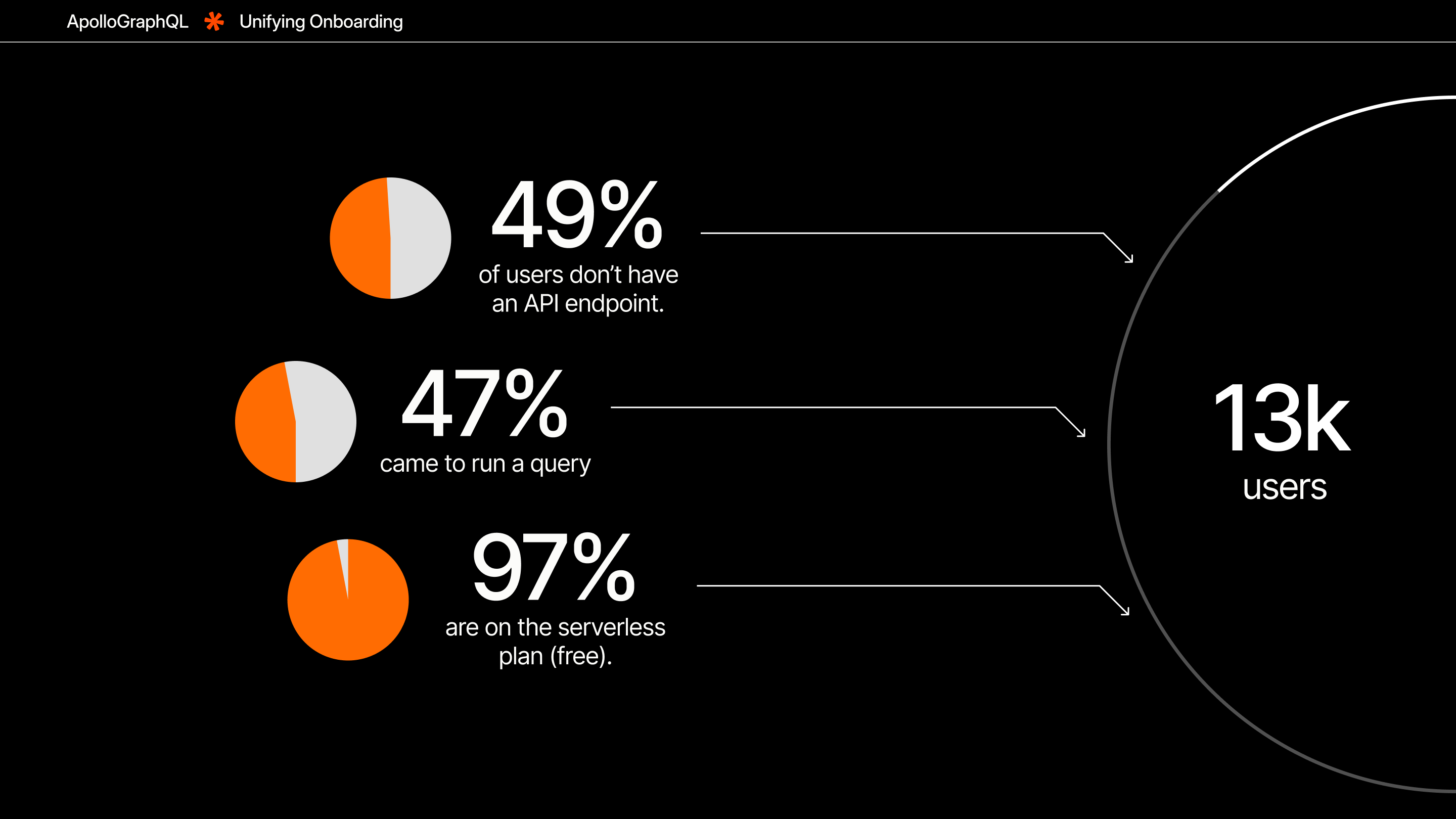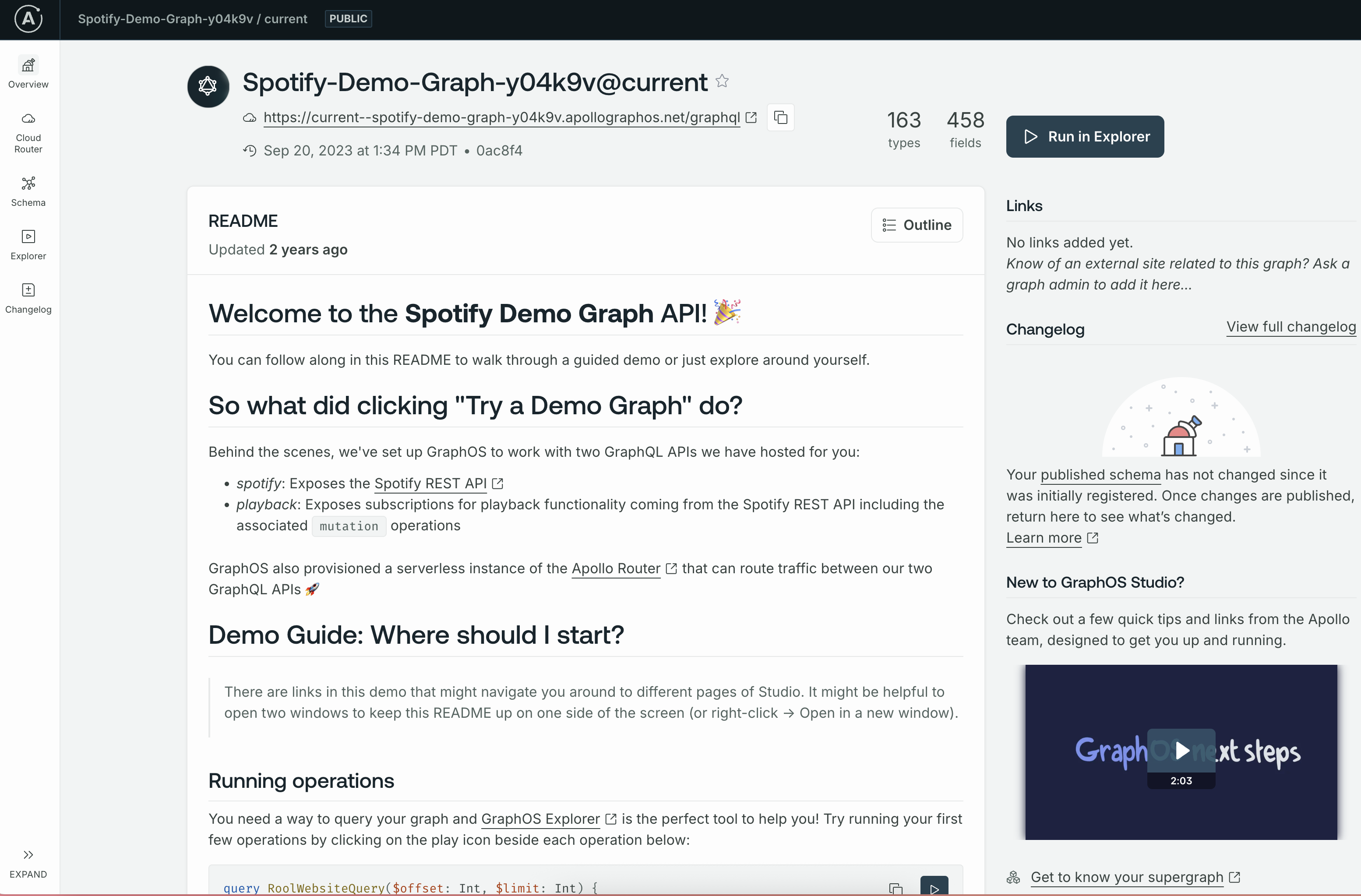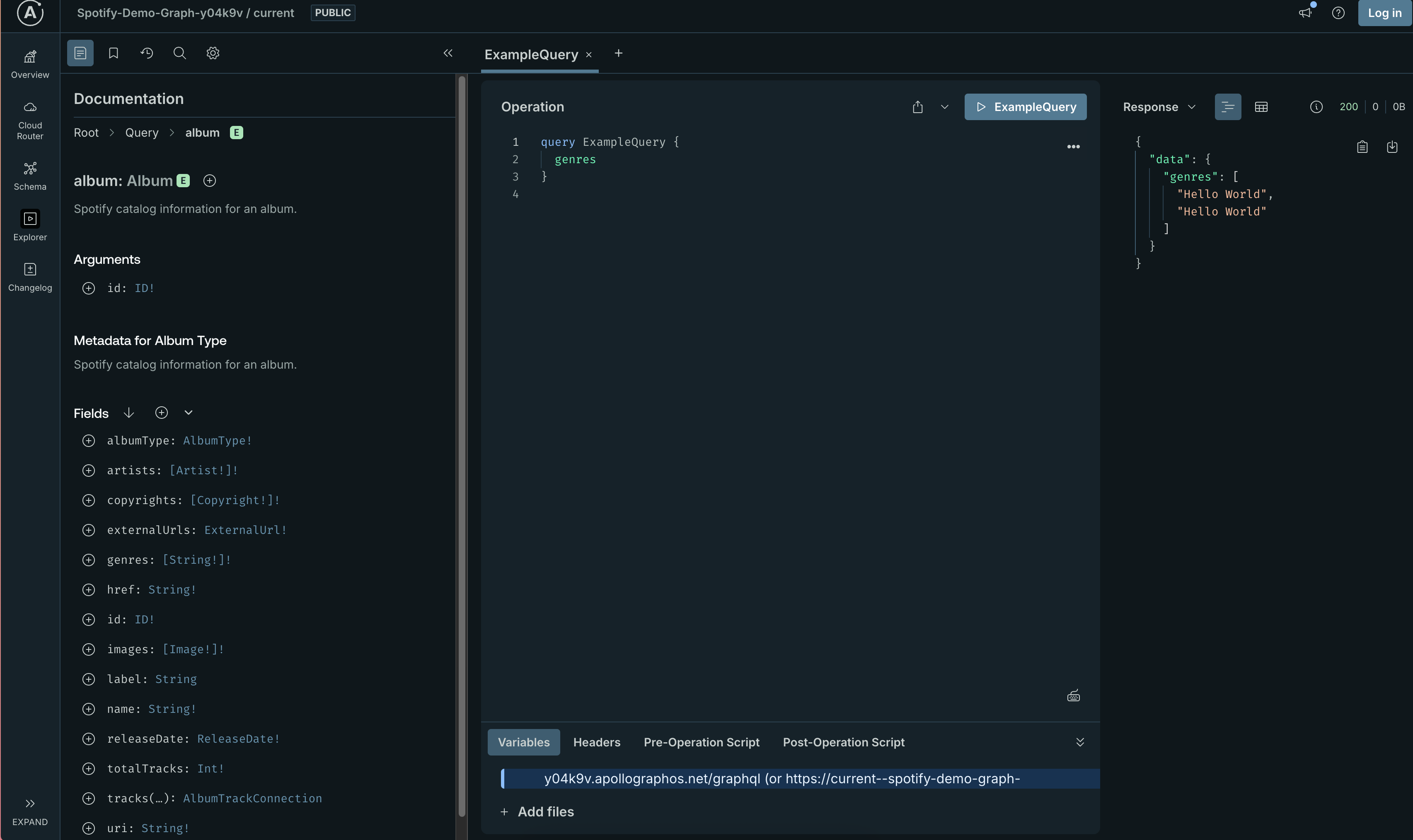Accelerating developer activation: Reducing onboarding drop-off by 45%
Boosting developer activation at Apollo: Over two years, I led the redesign of Apollo’s onboarding experience—improving developer engagement by 55% and driving 30% of new sign ups through our Spotify demo.

Overview
I led the multi-phase redesign of Apollo’s onboarding experience, starting with a research-driven survey and evolving into a unified onboarding hub. This work reframed onboarding from a rigid, one-size-fits-all entry point into a flexible, trust-building system. The outcome: drop-off fell by 45%, engagement rose from 8% to 55%, and onboarding became one of Apollo’s strongest adoption and growth levers.
Context
Apollo is a leader in GraphQL tooling and creator of GraphOS, a platform for building, managing, and scaling GraphQL APIs. GraphOS gave engineering teams a unified way to manage schemas, monitor performance, and secure access — but our onboarding told a different story.
When I joined, only 8% of new users moved past the first screen, and conversions hovered at 0.1%. More than half of sign-ups didn’t have an API endpoint but were funneled into a flow that required one. The result: a 92% drop-off rate, no clear paths for learners, and confusion even among evaluators who came ready to trial Apollo.
Discovery insights
I started by designing a three-step onboarding survey to capture goals, experience level, and intended use. We were seeking to understand more around our persona segments (who are these people), their jobs to be done (what goals do they want to achieve?), and their journey thus far (from learning GraphQL all the way to having a graph in prod). We collected over 13,000 responses in a few weeks, which confirmed that more than half of signups lacked a graph and roughly seventy percent were exploring and learning rather than immediately integrating.

This survey accomplished:
- Capturing user goals, experience level, and intended use
- First segmentation of users based on motivations
- Introduced light personalization to onboarding emails
The most important takeaway from the survey focused on developer use cases (aka, why are you here?), with almost 50% of survey respondents sharing their top use-case was running a query.. meaning they are coming with the intention of doing something.
- Initial onboarding data revealed nearly half of sign-ups had no graph;
- Most just wanted to run a query or explore GraphQL.
- We had no real path for people who didn’t have one—so activation stalled.
Problem
The core issues were intent mismatch and trust. We asked for sensitive details before explaining value or compliance, used Apollo-specific jargon that confused newcomers, and offered no viable entry for someone who simply wanted to run a query or learn GraphQL. Because the funnel was one-size-fits-all, different motivations fought the same UI—and most people bailed.
- Intent mismatch: >50% of users had no graph but onboarding assumed they did.
- Trust gaps: Users were asked for sensitive API info before understanding Apollo’s value.
- Opaque language: Terms like supergraph and router confused beginners.
- No paths to learn: Developers exploring GraphQL couldn’t run a simple query.
- Rigid funnel: One-size-fits-all design left no room for different user goals.
Opportunity
Treat onboarding as a strategic first impression, not a compliance step. That meant tailoring the start to user intent, making an early “this is valuable” moment possible without configuration, and using onboarding itself to instrument and validate emerging features (e.g., REST connectors, private graphs, Odyssey tutorials, and a demo graph).
- Tailor the experience to different intents (learners, evaluators, experienced users).
- Show immediate value through demos and learning tools.
- Use onboarding to validate new product bets like REST connectors and private graphs.
- Align onboarding with Apollo’s shift to product-led growth.
Goals
- Primary: get new users to a first “this is valuable” moment quickly.
- User-level: remove dead ends; support learners and technical evaluators without assuming they have a graph; make sensitive asks only after context.
- Business-level: reduce drop-off and increase engagement; use onboarding signals to guide roadmap and growth experiments; make onboarding a dependable engine for adoption (not a barrier).
My role
As Staff Product Designer, I led end-to-end design strategy across three phases:
- Onboarding Survey (V1): Designed the segmentation survey and synthesized 13k+ responses.
- Onboarding Fixes (V1 rollout): Simplified copy, deferred sensitive asks, introduced basic trust-building guidance.
- Unified Onboarding (V2): Designed a modular hub with multiple entry paths, integrating Apollo demos, tutorials, and features directly into onboarding.
I partnered with PMs, engineering leads, DevRel, sales, and marketing. I also pushed for adoption of Amplitude to track onboarding metrics.
Process
From there, I audited the existing journey, mapped the steep drop-off at the first API gate, and built low-fidelity prototypes that deferred sensitive asks, clarified language, and introduced progressive disclosure. We tested these flows with developers and internal champions, aligned terminology with DevRel and marketing, and instrumented each step in Amplitude so we could compare V1 friction-reduction against a more ambitious V2 that unified entry paths.
- Research & Survey
- Captured role, experience level, and goals from 13k+ new sign-ups.
- Found that >50% lacked a graph and ~70% were exploring GraphQL for learning.
- Insights led to prioritizing demo-first and learning-first pathways.
- Design & Iteration
- Prototyped new flows with progressive disclosure.
- Simplified copy to industry-standard terms.
- Introduced contextual tooltips for clarity.
- Cross-functional Alignment
- Partnered with DevRel to embed Odyssey tutorials.
- Collaborated with engineering on feature rollout (REST connectors, demo graph).
- Worked with marketing to refresh onboarding emails and education flows.
Solution
Phase 1: Survey driven insights
- 3-step onboarding survey segmented users by goals and experience.
- Revealed the “no graph” cohort, shaping future onboarding strategy.
- Informed content updates and DevRel priorities.
Phase 2: Onboarding improvements (V1)
V1 focused on removing the early blockers. I clarified the landing screen, added a brief “what’s about to happen” overview with links to security information, rewrote the endpoint step in plain language with in-context help, and—crucially—introduced a real path for people without a URL. Sensitive configuration moved later, after users had enough context to trust the process. This alone lifted engagement and made the first-run feel less like a wall.
- Deferred API asks until later.
- Added plain-language explanations of compliance.
- Provided a fallback path for users without an endpoint.
Phase 3: Unified onboarding (V2)
V2 replaced the single, rigid path with a modular hub designed around intent. From the first screen, users could choose to try a live demo (the Spotify example), connect what they already had via REST or start from boilerplates, or jump straight into Odyssey tutorials to build skills. Tooltips and copy used industry-standard terms before Apollo-specific language, and the structure remained consistent across tiers so there were no dead ends or relearning moments. The demo path became a fast, low-risk way to run a query in under a minute—no credentials, no config—while other paths offered a smoother bridge for users who did have assets to connect.
- Designed a modular hub with multiple entry points:
- Spotify demo: Run a live query in under a minute. Accounted for 30% of new onboardings.
- REST connectors + boilerplates: Options for users with existing APIs.
- Odyssey tutorials: Path to learn and build skills.
- Consistent flow across free and paid tiers, removing dead ends.


The impact of the demo
- See value fast: Click Demo → run a sample request → see the result in under a minute.
- Zero setup: No credentials, no config, safe read-only environment.
- Make it tangible: Simple explainer shows how one API pulls data from several services (no jargon).
- Choose a next step: From Demo, jump to connect your own API, use a boilerplate, or start the 30-day Dedicated trial.
- Consistent across tiers: Same flow for free and Dedicated—no relearning, no dead ends.
Impact & outcomes
Activation rose from 8% to 55% and drop-off across critical steps fell by 45%. The demo experience quickly accounted for about 30% of new signups, proving that “see value first” was the right bet.
Our research opt-in base grew from zero to more than a thousand within three months, giving the team a sustainable panel for ongoing feedback. Perhaps most importantly, onboarding turned into a reliable instrumented surface for validating product directions—click and completion patterns from onboarding directly shaped prioritization for REST connectors, private graphs, Odyssey entry points, and future education-led pathways.
- Engagement: 8% → 55% activation.
- Drop-off: Reduced by 45%.
- Adoption: Demo experience accounted for 30% of new sign-ups.
- Sales enablement: Onboarding became a stronger lead-gen driver by surfacing qualified users.
- Feature validation: Click-through data directly shaped roadmap priorities (REST connectors, Odyssey).
Reflections
Personalization—even light, survey-driven segmentation—mattered more than any individual screen. Trust had to come first: deferring sensitive setup until after a clear explanation changed how developers felt about the product. And treating onboarding as strategy, not ceremony, unlocked both adoption and a clearer signal for what we should build next.







